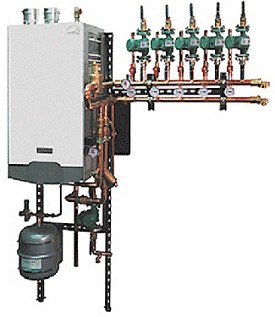BOILER MAINTENANCE
An Annual Service Contract Will Save $$$$
The Importance of Maintaining Your Residential Boiler
If you have just recently purchased or installed a new boiler for your residence (new or existing), then you are painfully aware of the cost of a new boiler in today's world. Of course, your new boiler is higher efficiency and will return your investment over time, but now is the best time to institute a boiler maintenance schedule.

Your new piece of equipment will provide many years of service in your home, and those years can be expanded even more by annual service. Proactive service now is much less expensive than those emergency service calls once a failure has occurred.
Most Heating and Plumbing companies offer very reasonable boiler maintenace or service contracts. This annual service is performed usually in the fall, before
your boiler is called upon to perform. Any issues can easily be handled now before they become a major inconvenience and expense.
Inspection and Cleaning
This should be performed annually by a qualified technician. A dirty boiler can run inefficiently, costing you dollars with the utilities.
Dirty boilers fail more often. During an inspection, a qualified technician will be able to identify and correct minor problems before they become major problems. As part of the provided annual service, the technician should de-scale the boiler in areas prone to hard water build-up.
Preventative Boiler Maintenance (homeowner)
Keep your boiler/mechanical room clean. Dust and dirt can foul up the boiler fan causing an overheating issue. Check the burner area of your boiler regularly to ensure that dust does not build up near the pilot light, if so equipped. A dust build up here can lead to a fire. Check regularly for water and gas leaks. Call immediately for service if leaks are found or suspected.
Monitor your System (homeowner and maintenance technician)
Keep a weekly log of temperatures, operating pressures, and water levels. Most boiler systems are equipped with gauges to monitor these items. A residential boiler should operate around 15 lbs of pressure. If the system pressure reaches a dangerous level, a relief valve should open to relieve the excess pressure. This valve could malfunction and allow a dangerous explosive level to exist. If this happens contact your service company immediately. Low water level means a leak in the system, call your technician immediately.
 Many problems can occur with a hot water heating system. Proper boiler maintenance will side-step many of these common system ailments:
Trapped air in the system, power loss at the boiler, low water level, pump or zone valve failure, pilot or electronic ignition failure, hard water deposits in the heat exchanger and boiler, thermostat failure, and even expansion tank failure.
Many problems can occur with a hot water heating system. Proper boiler maintenance will side-step many of these common system ailments:
Trapped air in the system, power loss at the boiler, low water level, pump or zone valve failure, pilot or electronic ignition failure, hard water deposits in the heat exchanger and boiler, thermostat failure, and even expansion tank failure.
Carbon Monoxide
Carbon Monoxide is produced by incomplete combustion of a fossil fuel. You cannot smell CO, a leak can be deadly for all occupants of the residence.
Any and all rooms containing gas-fired appliances should be equipped with a carbon monoxide detector. Co detectors can be purchased from battery powered units to hard-wired 110 volt units. For a new construction project always insist that your electrician prewire for CO detectors. Battery powered units should be used only on a temporary basis, until hard-wired units can be installed.
The smell of raw natural gas in a mechanical room is never acceptable. If you suspect a gas leak or exhaust gases in your mechanical room, at any time, call your service company or gas supplier immediately.
In conclusion, may we reiterate that annual care and a maintenance program (service contract) goes a long way to ensure your family's safety and comfort. Such a program also helps ensure that those inconvenient and expensive break-downs do not happen, and that you don't pay too much money at the meters.
Leave "Boiler Maintenance" and return to Radiant Heating main page
Leave "Boiler Maintenance" and Return to HOME

Enjoy this page? Please pay it forward. Here's how...
Would you prefer to share this page with others by linking to it?
- Click on the HTML link code below.
- Copy and paste it, adding a note of your own, into your blog, a Web page, forums, a blog comment,
your Facebook account, or anywhere that someone would find this page valuable.